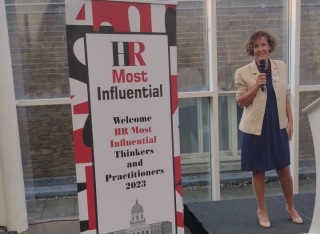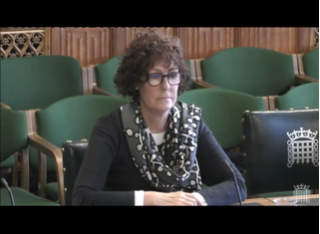
Professor Carol Woodhams
Academic and research departments
Surrey Business School, Faculty of Arts, Business and Social Sciences, Management.About
Biography
I joined Surrey Business School in 2018 after nine years at the University of Exeter Business School. Previous to that I have held posts at the University of Plymouth and Manchester Metropolitan University.
My research is interdisciplinary and theoretically grounded in psychology, management and sociology. I research a number of subjects bound by an interest in labour market disadvantage. Currently I am best known for my work that progresses the understanding of causes of pay gaps and pay inequality at the firm level. My latest papers are grounded in the analysis of organisation payroll data extracting learning about single-dimension and intersectional pay gaps / pay inequality using Blinder-Oaxaca decomposition methods. I show that women, and intersectional women and men are hindered in their prospects for equal pay by reward structures and their application by organisation elites.
Previously I have researched Chinese female managers and careers, disability equality plus disability studies methodology, diversity management, equal opportunities in SMEs and financing small business. My research is based in practice and applied in nature.I have published widely on these topics including articles in Human Resource Management, the Journal of Social Policy, Scandinavian Journal of Management, Human Resource Management Journal, and British Journal of Industrial Relations. Prior to an academic career I was a manager of people and operations in the hospitality sector and practiced in organisations in the UK and Australia. I have been a National Examiner for “Designing and Delivering Training” and Chartered Fellow of the Chartered Institute of Personnel and Development (CIPD) and remain an External Moderator for them. I have been a consultant, author and adviser to the CIPD on the re-launch of their professional standards.
I enjoy applying my research skills to provide insight for individual employers - largely NHS Trusts and UK HE institutions - diagnosing patterns in wages between men and women, and further at the level of dual and multiple characteristics in order to co-develop best practice reward strategies to overcome pay gaps and pay inequality. My work results in a report and ongoing coaching relationship delivering advice on remedial strategies to eliminate pay gaps. It was recognised with the award of a high-profile national project - Overcoming Pay Gaps in Medicine sponsored by the Department of Health and Social Care due for a COVID-delayed launch in 2020. I continue to conduct research on inequalities in the health sector.
Affiliations and memberships
News
ResearchResearch interests
My research interests focus on the employment of disadvantaged groups including:
- the intersections of gender, disability, age and ethnicity linked to employment outcomes
- organisation-level pay gaps within multiple settings including the NHS and universities
- gender and careers in China
- theoretical diversity and equality
Recent grant awards:
Sept 2020: £9,950*
The progression gap in Medicine: a longitudinal analysis addressing why fewer women and BAME doctors are promoted to consultant posts. British Academy/ Leverhulme Application SRG20\201341
March 2020: £13,000*
QS Strategic Development Fund. Career Progression in Medicine: pilot analysis.
March 2019: £22,000*
NHS England on review project Two Literature and Evidence Reviews for the Unified Information Standard for Protected Characteristics (UISPC) Scoping Project (with Tara Reich, Rashpal Dhensa-Kahlon and YingFei Heliot)
May 2018: £115,147*
Gender Pay Gaps in Medicine. The Department of Health and Social Care (with Prof Carol Atkinson, Dr Jo Blanden, Dr Duncan Brown, Dr Ioannis Laliotis, Dr Mark Williams and Sheila Wild)
Feb 2016: £31,980*
The ESRC GW4 Pay Equality Research Consortium (with Dr Emma Jeanes, Dr Alison Parken, Dr Susan Milner, Dr Gregory Schwarz and Rhys Davies.
May 2015: £15,700*
The ESRC GW4 Pay Equality Research Consortium (with Dr Alison Parken, Cardiff, Professor Harriet Bradley, Bristol and Dr Susan Harkness, Bath)
July 2011: £45,000*
‘Educating the next Generation of HR professionals’ Chartered Institute of Personnel and Development
Selected Publications:
Woodhams, C., Trojanowski, G. and Wilkinson, K., 2022. Merit sticks to men: gender pay gaps and (In) equality at UK Russell Group Universities. Sex Roles, pp.1-15.
Woodhams, C., Fernando, D., Huo, Y. and Dente, G., 2022. Exploring the Interplay between Pay, Career Barriers, and Management Support: An Intersectional Study of Migrant Doctors. Academy of Management Discoveries, (forthcoming)
Woodhams, C., Parnerkar, I. and Tomaskovic-Devey, D., 2022. Relational Inequalities in UK Surgery: Gender, Race and Closure. In Academy of Management Proceedings (Vol. 2022, No. 1, p. 16279). Briarcliff Manor, NY 10510: Academy of Management.
Woodhams, C., Williams, M., Dacre, J., Parnerkar, I. and Sharma, M., 2021. Retrospective observational study of ethnicity-gender pay gaps among hospital and community health service doctors in England. BMJ open, 11(12), p.e051043.
Dacre, J., Woodhams, C., Atkinson, C., Laliotis, I., Williams, M., Blanden, J., Wild, S. and Brown, D., 2020. Independent review into gender pay gaps in medicine in England.
Woodhams, C, Lupton, B, Perkins, G and Cowling, M (2015), "Multiple Disadvantage and Wage Growth: The effect of merit pay on pay gaps", Human Resource Management. Available online DOI 10.1002/hrm21692 JQG4 IF 1.817
Woodhams, C, Xian, H, and Lupton, B (2014) “Women Managers’ Careers in China: Theorizing the Influence of Gender and Collectivism” Human Resource Management. Available online DO1 10.1002/HRM 21643 JQG4 IF 1.817
Woodhams, C, Lupton, B and Cowling, M (2014) "The presence of ethnic minority and disabled men in feminised work: Intersectionality, vertical segregation and the glass escalator." Sex Roles: A Journal of Research (DOI: 10.1007/s11199-014-0427-z) IF 1.73
Woodhams, C, Lupton, B and Cowling, M. (2013 Reissued Jan 2015) The Snowballing Penalty Effect: Multiple Disadvantage and Pay. British Journal of Management DOI: 10.1111/1467-8551.12032 JQG4 IF 2.982
Woodhams, C and Lupton, B (2014),"Transformative and emancipatory potential of intersectionality research", Gender in Management: An International Journal, Vol. 29 Iss 5 pp. 301 - 307. JQG1 IF 1.000
Metcalfe, B and Woodhams, C (2012) New Directions in Gender, Diversity and Organization Theorizing – Re-imagining Feminist Post-colonialism, Transnationalism and Geographies of Power. International Journal of Management Reviews Volume 14, Issue 2, June 2012. JQG3 IF 3.333
Jayawarna, D, Woodhams, C and Jones, O (2012) Gender and alternative start-up business funding. Competition and Change Volume 16, Number 4, October 2012 , pp. 303-322(20) JQG2 IF 1.812
Woodhams, C., & Lupton, B (2009). Analysing gender-based diversity in SMEs. Scandinavian Journal of Management Vol 25 pp. 203 – 231. JQG2 IF 1.45
Woodhams, C, Xian, H and Lupton, B (2009), ‘Furthering Equal Opportunity in China: Sex Discrimination and Gender Segregation in Chinese Labour markets’, International Journal of Human Resource Management, vol 20, no 10, pp. 2084-2019 JQG3 IF 1.65
Woodhams, C and Corby, S (2007) Then and Now: Disability Legislation and Employers’ Practices in the UK British Journal of Industrial Relations. 45:3 Sept 2007 pp. 556 – 580. JQG 4 IF 1.868
Woodhams, C and Lupton, B (2006) ‘Equal Opportunities Policy and Practice in Small Firms: The Impact of HR Professionals’. Human Resource Management Journal Vol. 16, No 1, pp. 74-97 JQG 4 IF 2.147
Books, reports and book chapters.
TAYLOR, S. and WOODHAMS, C., 2022. Studying Human Resource Management: A Guide to the Study, Context and Practice of HR. Kogan Page.
TAYLOR, S. and WOODHAMS, C., 2022. Human Resource Management People and Organisations. Kogan Page.
Reich, T, Dhensa-Kahlon, R, Heliot Y, & Woodhams C (forthcoming) Literature and Evidence Reviews for the Unified Information Standard for Protected Characteristics (UISPC) Scoping Project Report for NHS England.
Research projects
Academics in the Surrey Business School at the University of Surrey Lead by Professor Woodhams have received a research grant from the Department of Health and Social Care to study causes of the gender pay gap in the medical profession.
The aims of the project are to identify the causes of the gender pay gap in medicine through the interrogation of datasets, along with the development of qualitative evidence identifying the impact of cultural, practical and psychological issues contributing to the gender pay gap in medicine. The project was triggered as a result of an independent report commissioned by Jeremy Hunt, Secretary of State for Health and Social Care. Devised in 2016 after the junior doctors contract negotiations, the report called for the reduction and elimination of gender pay gaps in the medical profession.
Twitter @paygapsmedics
Research interests
My research interests focus on the employment of disadvantaged groups including:
- the intersections of gender, disability, age and ethnicity linked to employment outcomes
- organisation-level pay gaps within multiple settings including the NHS and universities
- gender and careers in China
- theoretical diversity and equality
Recent grant awards:
Sept 2020: £9,950*
The progression gap in Medicine: a longitudinal analysis addressing why fewer women and BAME doctors are promoted to consultant posts. British Academy/ Leverhulme Application SRG20\201341
March 2020: £13,000*
QS Strategic Development Fund. Career Progression in Medicine: pilot analysis.
March 2019: £22,000*
NHS England on review project Two Literature and Evidence Reviews for the Unified Information Standard for Protected Characteristics (UISPC) Scoping Project (with Tara Reich, Rashpal Dhensa-Kahlon and YingFei Heliot)
May 2018: £115,147*
Gender Pay Gaps in Medicine. The Department of Health and Social Care (with Prof Carol Atkinson, Dr Jo Blanden, Dr Duncan Brown, Dr Ioannis Laliotis, Dr Mark Williams and Sheila Wild)
Feb 2016: £31,980*
The ESRC GW4 Pay Equality Research Consortium (with Dr Emma Jeanes, Dr Alison Parken, Dr Susan Milner, Dr Gregory Schwarz and Rhys Davies.
May 2015: £15,700*
The ESRC GW4 Pay Equality Research Consortium (with Dr Alison Parken, Cardiff, Professor Harriet Bradley, Bristol and Dr Susan Harkness, Bath)
July 2011: £45,000*
‘Educating the next Generation of HR professionals’ Chartered Institute of Personnel and Development
Selected Publications:
Woodhams, C., Trojanowski, G. and Wilkinson, K., 2022. Merit sticks to men: gender pay gaps and (In) equality at UK Russell Group Universities. Sex Roles, pp.1-15.
Woodhams, C., Fernando, D., Huo, Y. and Dente, G., 2022. Exploring the Interplay between Pay, Career Barriers, and Management Support: An Intersectional Study of Migrant Doctors. Academy of Management Discoveries, (forthcoming)
Woodhams, C., Parnerkar, I. and Tomaskovic-Devey, D., 2022. Relational Inequalities in UK Surgery: Gender, Race and Closure. In Academy of Management Proceedings (Vol. 2022, No. 1, p. 16279). Briarcliff Manor, NY 10510: Academy of Management.
Woodhams, C., Williams, M., Dacre, J., Parnerkar, I. and Sharma, M., 2021. Retrospective observational study of ethnicity-gender pay gaps among hospital and community health service doctors in England. BMJ open, 11(12), p.e051043.
Dacre, J., Woodhams, C., Atkinson, C., Laliotis, I., Williams, M., Blanden, J., Wild, S. and Brown, D., 2020. Independent review into gender pay gaps in medicine in England.
Woodhams, C, Lupton, B, Perkins, G and Cowling, M (2015), "Multiple Disadvantage and Wage Growth: The effect of merit pay on pay gaps", Human Resource Management. Available online DOI 10.1002/hrm21692 JQG4 IF 1.817
Woodhams, C, Xian, H, and Lupton, B (2014) “Women Managers’ Careers in China: Theorizing the Influence of Gender and Collectivism” Human Resource Management. Available online DO1 10.1002/HRM 21643 JQG4 IF 1.817
Woodhams, C, Lupton, B and Cowling, M (2014) "The presence of ethnic minority and disabled men in feminised work: Intersectionality, vertical segregation and the glass escalator." Sex Roles: A Journal of Research (DOI: 10.1007/s11199-014-0427-z) IF 1.73
Woodhams, C, Lupton, B and Cowling, M. (2013 Reissued Jan 2015) The Snowballing Penalty Effect: Multiple Disadvantage and Pay. British Journal of Management DOI: 10.1111/1467-8551.12032 JQG4 IF 2.982
Woodhams, C and Lupton, B (2014),"Transformative and emancipatory potential of intersectionality research", Gender in Management: An International Journal, Vol. 29 Iss 5 pp. 301 - 307. JQG1 IF 1.000
Metcalfe, B and Woodhams, C (2012) New Directions in Gender, Diversity and Organization Theorizing – Re-imagining Feminist Post-colonialism, Transnationalism and Geographies of Power. International Journal of Management Reviews Volume 14, Issue 2, June 2012. JQG3 IF 3.333
Jayawarna, D, Woodhams, C and Jones, O (2012) Gender and alternative start-up business funding. Competition and Change Volume 16, Number 4, October 2012 , pp. 303-322(20) JQG2 IF 1.812
Woodhams, C., & Lupton, B (2009). Analysing gender-based diversity in SMEs. Scandinavian Journal of Management Vol 25 pp. 203 – 231. JQG2 IF 1.45
Woodhams, C, Xian, H and Lupton, B (2009), ‘Furthering Equal Opportunity in China: Sex Discrimination and Gender Segregation in Chinese Labour markets’, International Journal of Human Resource Management, vol 20, no 10, pp. 2084-2019 JQG3 IF 1.65
Woodhams, C and Corby, S (2007) Then and Now: Disability Legislation and Employers’ Practices in the UK British Journal of Industrial Relations. 45:3 Sept 2007 pp. 556 – 580. JQG 4 IF 1.868
Woodhams, C and Lupton, B (2006) ‘Equal Opportunities Policy and Practice in Small Firms: The Impact of HR Professionals’. Human Resource Management Journal Vol. 16, No 1, pp. 74-97 JQG 4 IF 2.147
Books, reports and book chapters.
TAYLOR, S. and WOODHAMS, C., 2022. Studying Human Resource Management: A Guide to the Study, Context and Practice of HR. Kogan Page.
TAYLOR, S. and WOODHAMS, C., 2022. Human Resource Management People and Organisations. Kogan Page.
Reich, T, Dhensa-Kahlon, R, Heliot Y, & Woodhams C (forthcoming) Literature and Evidence Reviews for the Unified Information Standard for Protected Characteristics (UISPC) Scoping Project Report for NHS England.
Research projects
Academics in the Surrey Business School at the University of Surrey Lead by Professor Woodhams have received a research grant from the Department of Health and Social Care to study causes of the gender pay gap in the medical profession.
The aims of the project are to identify the causes of the gender pay gap in medicine through the interrogation of datasets, along with the development of qualitative evidence identifying the impact of cultural, practical and psychological issues contributing to the gender pay gap in medicine. The project was triggered as a result of an independent report commissioned by Jeremy Hunt, Secretary of State for Health and Social Care. Devised in 2016 after the junior doctors contract negotiations, the report called for the reduction and elimination of gender pay gaps in the medical profession.
Twitter @paygapsmedics
Teaching
2025/6 teaching.
MSc HRM Contemporary Employee Relations MANM346 (module leader)
BSc Business and Management - Human Resource Management MAN2133
Publications
ObjectivesTo identify differences in average basic pay between groups of National Health Service (NHS) doctors cross-classified by ethnicity and gender. Analyse the extent to which characteristics (grade, specialty, age, hours, etc.) can explain these differences.DesignRetrospective observational study using repeated cross-section design.SettingHospital and Community Health Service (HCHS) in England.ParticipantsAll HCHS doctors in England employed by the NHS between 2016 and 2020 appearing in the Digital Electronic Staff Record dataset (average N=99 953 per year).Main outcome measuresHours-adjusted full-time equivalent pay gaps; given as raw data and further adjusted for demographic, job, and workplace characteristics (such as grade, specialty, age, whether British nationality, region) using multivariable regression and statistical decomposition techniques.ResultsPay gaps relative to white men vary with the ethnicity-gender combination. Indian men slightly out-earn white men and Bangladeshi women have a 40% pay gap. In most cases, pay gaps can largely be explained by characteristics that can be measured, especially grade, with the extent varying by specific ethnicity-gender group. However, a portion of pay gaps cannot be explained by characteristics that can be measured.ConclusionsThis study presents new evidence on ethnicity-gender pay gaps among NHS doctors in England using high quality administrative and payroll data. The findings indicate all ethnicity-gender groups earn less than white men on average, except for Indian men. In some cases, these differences cannot be explained giving rise to discussions about the role of discrimination.
Academic studies of gender pay gaps within higher education institutions have consistently found pay differences. However, theory on how organisation-level factors contribute to pay gaps is underdeveloped. Using a framework of relational inequalities and advanced quantitative analysis, this paper makes a case that gender pay gaps are based on organisation-level interpretations and associated management practices to reward ‘merit’ that perpetuate inequalities. Payroll data of academic staff within two UK Russell Group universities (N = 1,998 and 1,789) with seeming best-practice formal pay systems are analysed to determine causes of gender pay gaps. We find marked similarities between universities. Most of the variability is attributed to factors of job segregation and human capital, however we also delineate a set of demographic characteristics that, when combined, are highly rewarded without explanation. Based on our analysis of the recognition of ‘merit,’ we extend theoretical explanations of gender pay gap causes to incorporate organisation-level practices.
Excel at human resource management studies and prepare for a role as a people professional with this bestselling textbook.
This paper makes the case that the current single-axis approach to the diagnosis and remedy of pay discrimination is inadequate in the case of multiple disadvantage. While a good deal is known about pay gaps, particularly those affecting women, less is known about those affecting people in other disadvantaged groups and those in more than one such group. This analysis of multiple years of pay data, n=513,000, from a large UK-based company shows that people with more than one disadvantaged identity suffer a significantly greater pay penalty than those with a single disadvantage. The data also suggest that penalties associated with multiple disadvantage exponentially increase. In other words, disadvantages seem to interact to the detriment of people at intersections'. The paper considers the implications for policies aimed at reducing pay inequalities. These currently take a single-axis approach and may be misdirected.
Southside University Hospital Trust (SUHT) is a world-renowned centre of clinical excellence and one of the largest NHS teaching trusts in the UK. In 2014 it became a Foundation Trust, giving it a greater degree of managerial and financial freedom. The Trust is made up of three hospitals and provides a wide range of clinical and specialist services. The Trust’s collaboration with the town’s internationally renowned university delivers world-class research and delivers high-quality education and training for doctors.
This article is concerned with developing an understanding of the careers of women managers in China. Existing literature suggests that while women in China are comparatively well represented in management roles, they face distinctive pressures and barriers to their progress arising from entrenched patriarchal and collectivist aspects of the Chinese cultural tradition. However, little is known about how these aspects impact on women's orientations towards their careers and to what extent influential Western career theories are adequate in interpreting their experience. Drawing on interviews with 20 women managers in China, the article interprets women's orientations towards their careers in relation to their adherence to traditional gender roles and collectivist values. Using this framework, a fourfold taxonomy is developed which identifies "conformist," "revolutionary," "soloist," and "dissident" orientations. The article suggests that Western career theories fail to capture the collective dimension, and thus do not account fully for the range of experience and orientations of Chinese women managers that are captured in the taxonomy. Implications, both practical and theoretical, are discussed. Recommendations are also made as to how management and career development policies might be developed in organizations in China in order to address the diverse needs and preferences of women managers. (C) 2014 Wiley Periodicals, Inc.
This chapter contains sections titled: Introduction Diversity, Equality and the Treatment of Groups Disabled People As the New ‘;GROUP’ Research Methods Managerial Perceptions of Disability Discussion Disability and Diversity–The Solution? Disability and Diversity–The Problems? Conclusions Endnote References
Purpose - The purpose of this study is to contribute to the debates of "doing" intersectionality in practice. The authors explore two of the primary approaches to researching from an intersectional perspective with the intention of critically reviewing the emancipatory potential of each. They argue for plurality and diversity of approaches in working toward a shared emancipatory goal. Design/methodology/approach - The authors set up the debate via an exploration of emancipatory research principles. Based on their research experience the authors then critically reflect on the approaches to intersectionality research from the social constructionist and critical realist perspectives. Findings - The authors find that both approaches to intersectionality research have benefits and limitations in achieving emancipation for disadvantaged people in organizations. A critical realist approach underpinned by quantitative analysis of patterns within fixed multiple identity categories offers a convincing emancipatory case which can stimulate management action. However, it does not give prominence to the dynamic and political nature of the construction of "difference" in organizations. Social constructionist approaches address this weakness, but the wider patterns of disadvantage tend to have less prominence in the analysis. Accordingly, the policy implications can be less clear and the case for action less convincing. Research limitations/implications - The authors provide material that contributes to debates of how to "do" intersectionality as a method. They acknowledge limitations in their argument supporting a critical realist approach from both methodological and emancipatory perspectives. Originality/value - They call for consideration of pluralism in research approaches to exploit the emancipatory potential of diverse forms of research.
Purpose - This paper seeks to examine the career experiences of seven women who have developed successful careers in the Chinese information technology (IT) industry, focusing on the way they managed their careers and the implications this has for women's career theory in China. Design/methodology/approach - Personal narrative method is used to explore the women's cumulated experiences of career management in order to draw out their feelings and attitudes. Findings - Findings demonstrated convergence between western career theory and the situation of these successful Chinese women in IT, especially in family/career role management. Nevertheless, the paper argues that deeply embedded values in China encourage a rejection of planning and proactivity in women's career management resulting in a lack of applicability of western theory. Research limitations/implications - Findings are based on a small sample size. Personal narrative method is highly subjective and "contaminated" by selective recall of information due to the deterioration or concealment of certain key factors. However, this finding in itself contains interesting implications for international career research. Practical implications - The career experiences of these women could provide role-modelling to other women who are also pursuing careers in the IT industry in China. Originality/value - The paper contributes to the developing discourse of women's career experiences within Chinese society. It highlights constraints and limitations of applying western models and traditional research techniques. It advocates a broad, contextualised approach that incorporates a stronger emphasis on internal and social values.
Recent research into gender equality in small- to medium-sized organisations (SMEs) in the UK demonstrates low engagement with a formal model of procedural equality. This paper explores whether a diversity approach might be more helpful in evaluating SME practice in the area of gender equality. Drawing on interview data with 80 owner/managers of SMEs, findings reveal an implicit sympathy with diversity practices and principles, underpinned by business rationales for action that could offer positive developments for women. Nevertheless, the data also show that the same rationale and the same practices serve to perpetuate discrimination, utilise stereotypes and continue the segregation of women into low paid, low skilled work. On the basis of these findings, we conclude that white a diversity management approach propels a perspective of women as a valuable resource within SMEs, relying on it in preference to regulated format procedural equality would be unwise. (C) 2009 Elsevier Ltd. All rights reserved.
Purpose - The purpose of this paper is to examine the take up of gender-based equal opportunities policies and practices in small to medium-sized enterprises (SMEs) and explores the relationship between size and take up within the SME sector.Design methodology approach - The paper draws on detailed data generated by a European Social Fund sponsored equality audit tool (breakthrough). This is an interactive, questionnaire-based programme incorporating 60 questions on human resources policies and practices relevant to gender-based equal opportunity. The questionnaire was administered within a structured interview, which was recorded and transcribed. In the North West of England, 80 SMEs, across a range of sectors, participated.Findings - The data revealed that, while there was some evidence of take up of good equality practice in SMEs, many small businesses were not active in this area and indeed a sizeable minority were perpetuating discriminatory practices. Medium-sized organisations were more likely to have, and implement, equality policies than small ones. However, in one area, around flexibility to meet carer responsibilities, the small organisations performed better. Analysis of moderating variables suggests that it is factors related to size, rather than size per se, that explain the differences in take up between small- and medium-sized firms.Originality value - The paper highlights the need to find ways to engage SME managers with the equality agenda. It explores the distinctive features of the small firms and their environment which may inhibit this at present and set out an agenda for future research which will deepen understanding in this area and inform policy.
Purpose - This paper aims to draw conceptual links between the papers in this special issue, arguing that diversity and equality research is located within varying socio-political, socio-demographic and geo-political contexts and should therefore be seen as fluid and subject to ongoing reformation. Design/methodology/approach - This paper provides a thematic and analytical review of six papers from the Gender, Diversity and Management track of the European Academy of Management Conference, held at HEC, Paris in May 2007. Findings - The paper draws out themes that transcend organisation and nation boundaries, showing how socio-cultural and political location has an important bearing on gender and diversity work identities, constructions and ultimately, organisation development priorities. Practical implications - The paper seeks to encapsulate contemporary thinking in the discipline of equality and diversity management with specific focus on its interaction with the externalities of region, power, politics and society. Originality/value - The paper contributes to the developing discourse of employment-based diversity research in the international arena. It highlights the limitations of a fixed perspective of identity and difference, stressing the need to account for positionality in scholarly research.
In this paper we present an analysis of recruitment advertisements that suggests that Chinese employers frequently discriminate on gender grounds, both directly and indirectly. We illustrate how employers continue to use entrenched stereotypes and perpetuate highly segregated expectations of men and women's roles at work, predominantly to the detriment of women and hindering their progress in the labour market. The paper concludes that while employers' recruitment practices are not the only cause of women's continued labour-market disadvantage - and are in themselves a function of the wider of economic, socio-cultural and ideological factors that underlie it (Kitching 2001; Patrickson 2001; Leung 2003; Cooke 2005) - a change to employer behaviour in this area is a necessary and potentially achievable step forward towards greater equality.
This paper questions the prescription of emancipatory participatory research for studying disability espoused by some disability researchers and activists. The paper argues that the advocacy of participatory and emancipatory research can be criticised on several grounds including problems of internal inconsistency and contradiction, an overly selective use of the works of feminist researchers and that research using such an approach could constitute an exercise of power that potentially marginalises some voices and potentially oppresses some disabled people and researchers. Ultimately, it is suggested, the emancipatory paradigm may serve to undermine the generation of knowledge that can be used by disabled people for self-emancipation. The paper concludes that rather than prescribe emancipatory research as the only legitimate methodology for disability research, disability writers should, as feminists have in researching gender, adopt a more pluralist and eclectic approach to theorising and researching disability.
This article examines whether men in female-dominated areas of work are disproportionately drawn from disadvantaged groups - specifically in relation to minority ethnicity and disability. Whilst there is a developing literature on the experiences of men in female-dominated work much less is known about who they are. Using intersectionality as a framework, it is theorised that men with disadvantaged identities may be less able to realise their gender advantage and avoid - or move out of - low-level and part-time feminised work. These expectations are tested with a quantitative analysis of personnel records for a large organisation with a workforce across the UK (n = 1,114,308). Analysis is based in consecutive years of data collection in the decade to 2006. Statistical analysis based on chi square tests show that not only are men with disadvantaged identities disproportionally more likely than other men to be found in female-dominated low-status work, but that they are relatively more likely to be so than are their female counterparts. Men from ethnic minorities, but not those with a disability, are also disproportionately more likely to be found in feminised part-time work. Both men from ethnic minorities and men with disabilities are disproportionally less likely than other men to ride the glass escalator to higher-level work. The article concludes that the intersectional effects of gender, ethnicity and disability sort disadvantaged men into lower-level and part-time work alongside women, and considers the implications for the study of men in female-dominated occupations, and of intersectionalities.
This article concerns rates of wage growth among women and minority groups and their impact on pay gaps. Specifically, it focuses on the pay progression of people with more than one disadvantaged identity, and on the impact of merit pay. Recent research indicates that pay gaps for people in more than one disadvantaged identity category are wider than those with a single-disadvantaged identity. It is not known whether these gaps are closing, at what rate, and whether all groups are affected equally; nor is it known whether merit pay alleviates or exacerbates existing pay gaps. In addressing these issues, the analysis draws on longitudinal payroll data from a large UK-based organization. Results show that pay gaps are closing; however, the rate of convergence is slow relative to the size of existing pay disparities, and slowest of all for people with disabilities. When the effect of merit pay is isolated, it is found to have a small positive effect in reducing pay gaps, and this effect is generally larger for dual/multiple-disadvantaged groups. These findings run counter to the well-established critique of merit pay in relation to equality outcomes. The implications of this are discussed, and an agenda for research and practice is set out. (c) 2015 Wiley Periodicals, Inc.
This special issue reviews contemporary gender and diversity insights into management and organization studies (MOS). The purpose of this issue is to critically evaluate key threads and concepts contributing to academic debates in diversity, gender and feminist theorizing. This paper highlights key threads in current scholarship, including relationality, power, intersectionality and social constructionist epistemologies and, in so doing, uncovers new insights and contributions. The paper provides a model which locates different themes and moments in the development of gender and diversity scholarship and acts as a heuristic device which can guide gender and diversity scholarship and assist in conceptualizing the field. Building on the key threads weaving the special issue together, the paper advances new understandings of gender and diversity through integrating feminist post-colonial scholarship, transnationalism and geographies of space and place literatures. The paper argues for scholars to re-imagine different possibilities for gender and diversity enquiry so as to encourage interdisciplinarity and align with social science research in contemporary critiques of globalization and global social capital in order to add richness and complexity to current theorizing. Specifically, the authors argue for MOS researchers to engage in dialogue with all global stakeholders, and they encourage cross-fertilization of theories and values between writers from both the Global North and the Global South.
Gain a thorough understanding of the key HR topics which affect employees and the overall business with this comprehensive textbook.
The UK’s National Health Service (NHS) is heavily reliant on migrant labour to deliver essential services. While evidence indicates that overseas doctors have less positive career outcomes that may result in pay gaps in comparison to UK-trained counterparts, extant theoretical explanations have been slow to consider the crucial role of workplace practices, and the degree to which pay gaps differ between multiple identity sub-groups. Adopting an intercategorical approach to analyse statistical survey data from 5,753 NHS doctors, we examine how pay gaps stem from career barriers and management support in male and female International Medical Graduate, European Economic Area and UK doctors. Our findings provide insights into intersectional variations in career barriers and pay gaps for skilled medical migrants which point to penalties for migrants, especially migrant ethnicized women. Based on our findings we extend the literature in two ways. First, we extend theoretical explanations of pay gaps by conceptualizing pay differences as a complex multi-layered concept that embrace workplace practices as well as intersecting demographic identities. Second, we contribute to theory on skilled migration by highlighting the counter-intuitive shape of management support on migrants’ careers and diversifying extant understandings of constraint and enablement in migrant careers.









